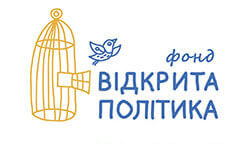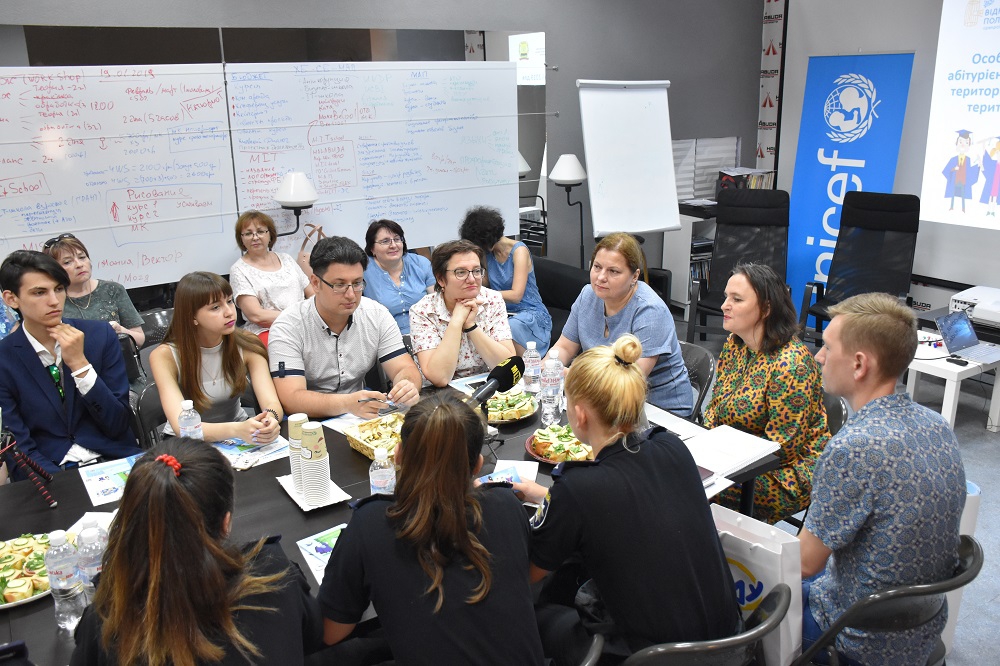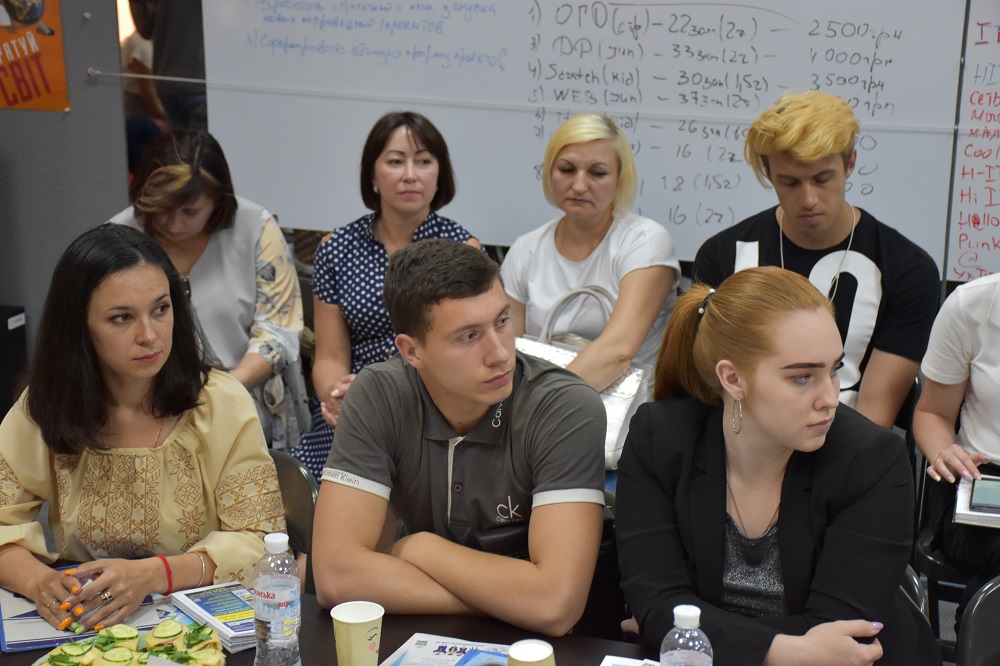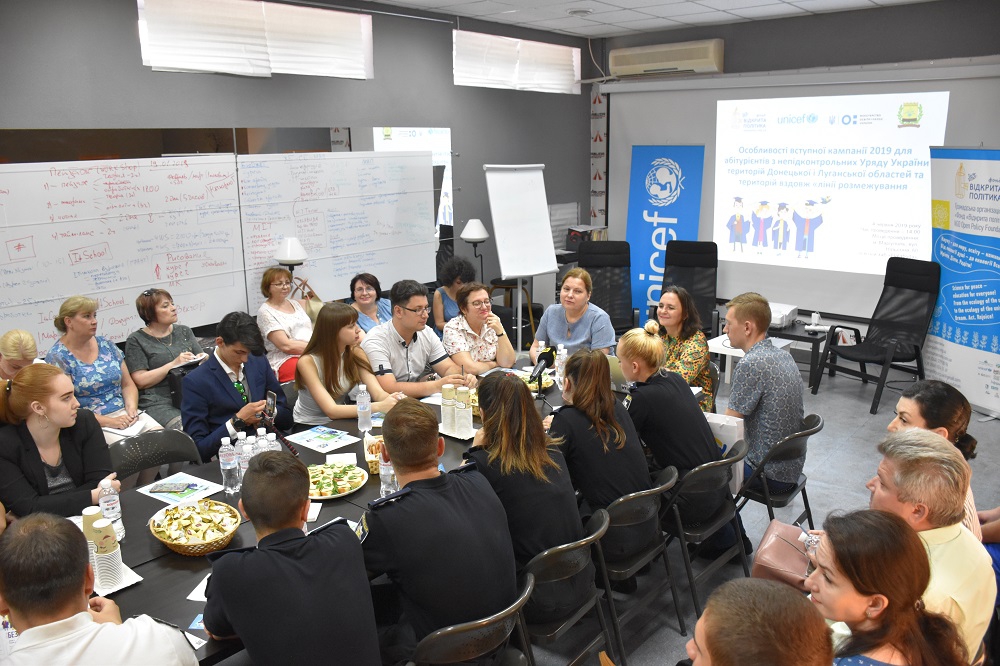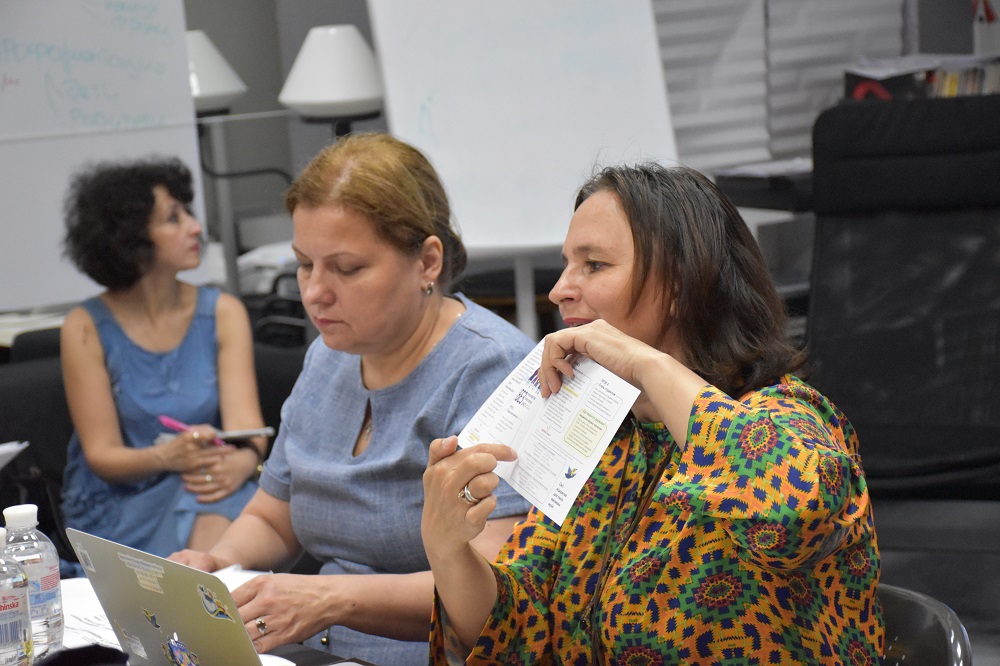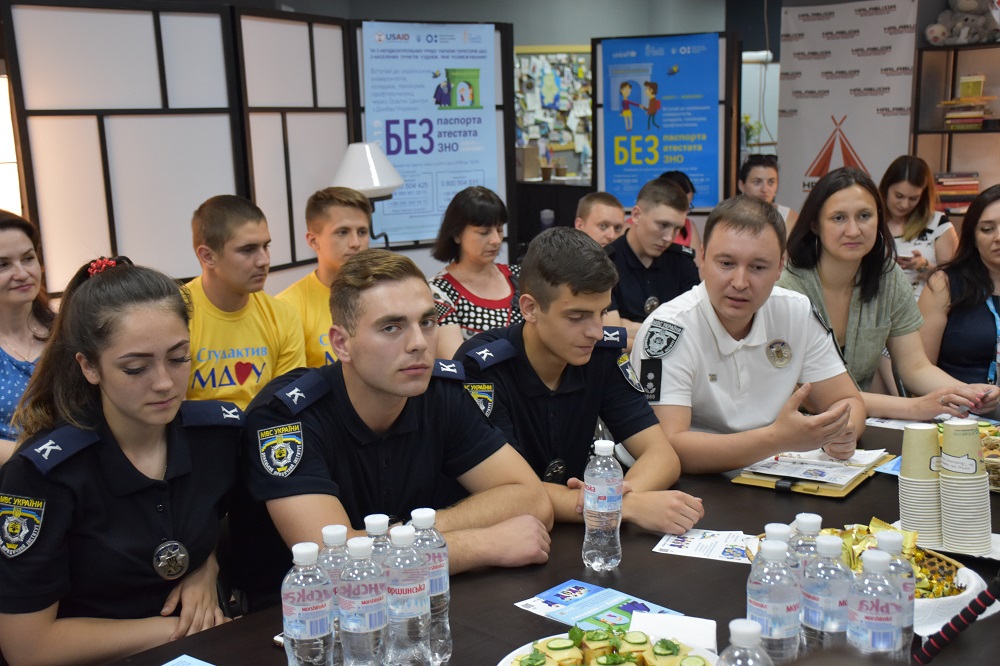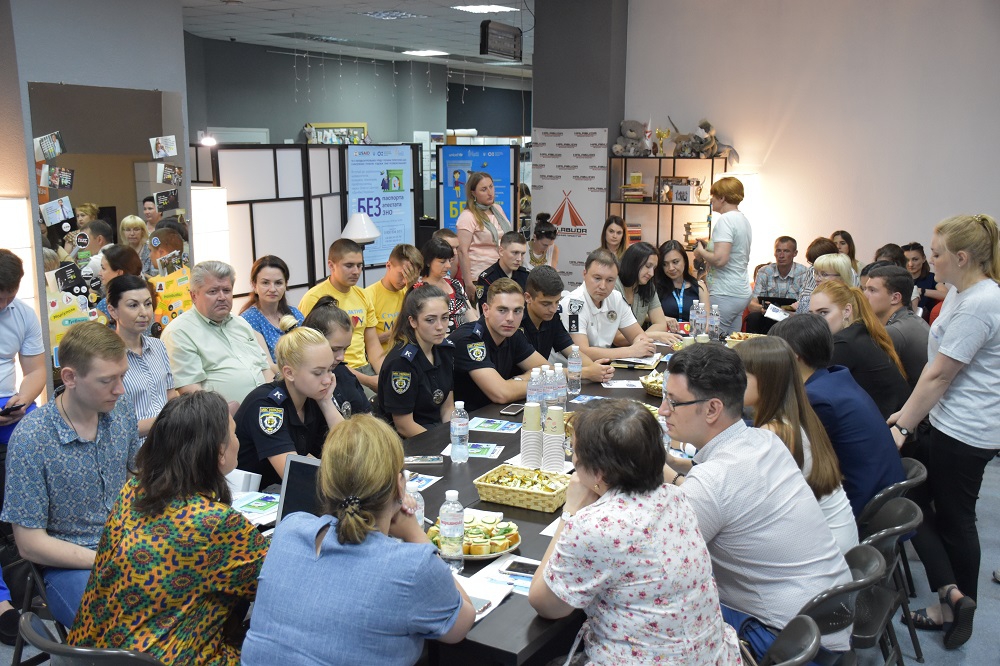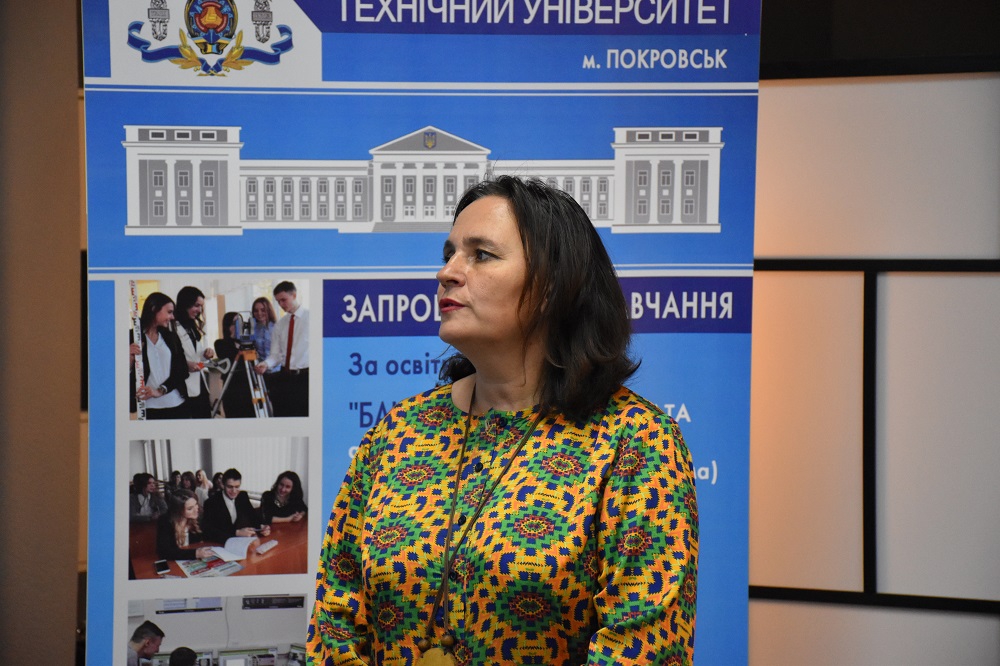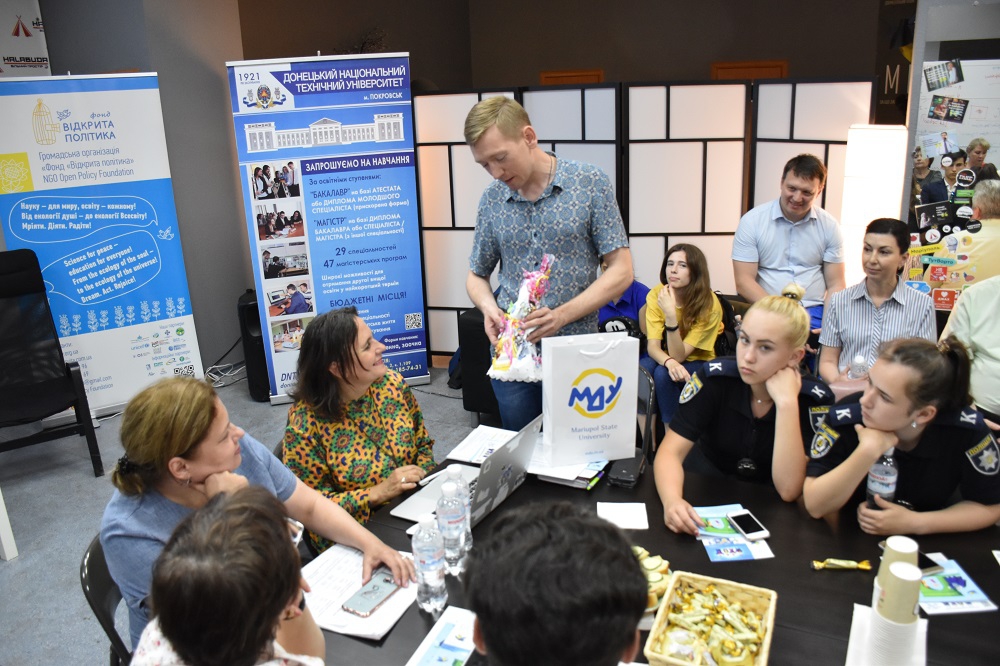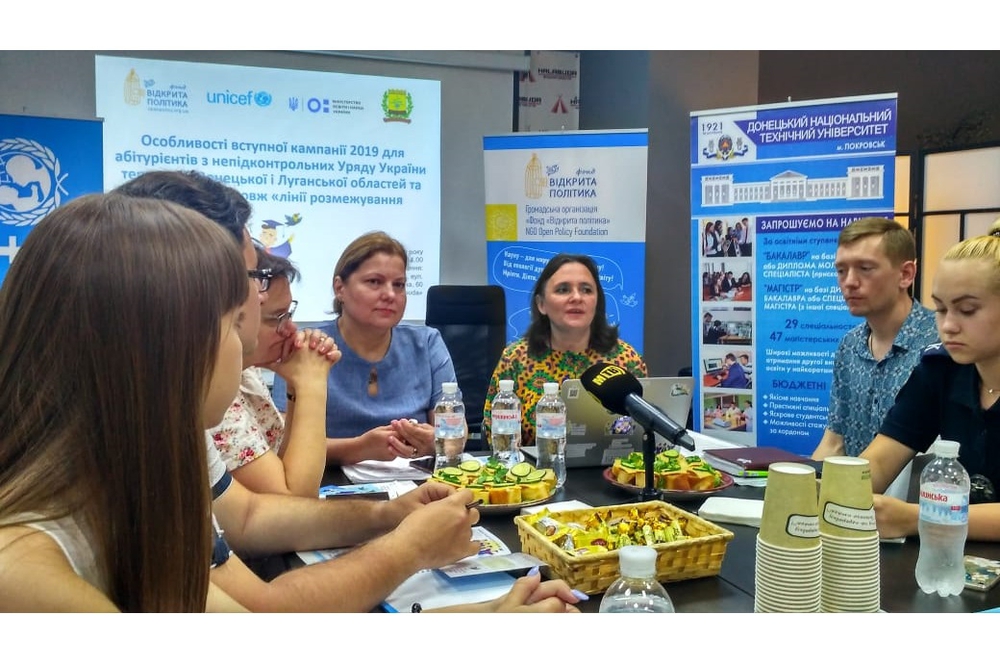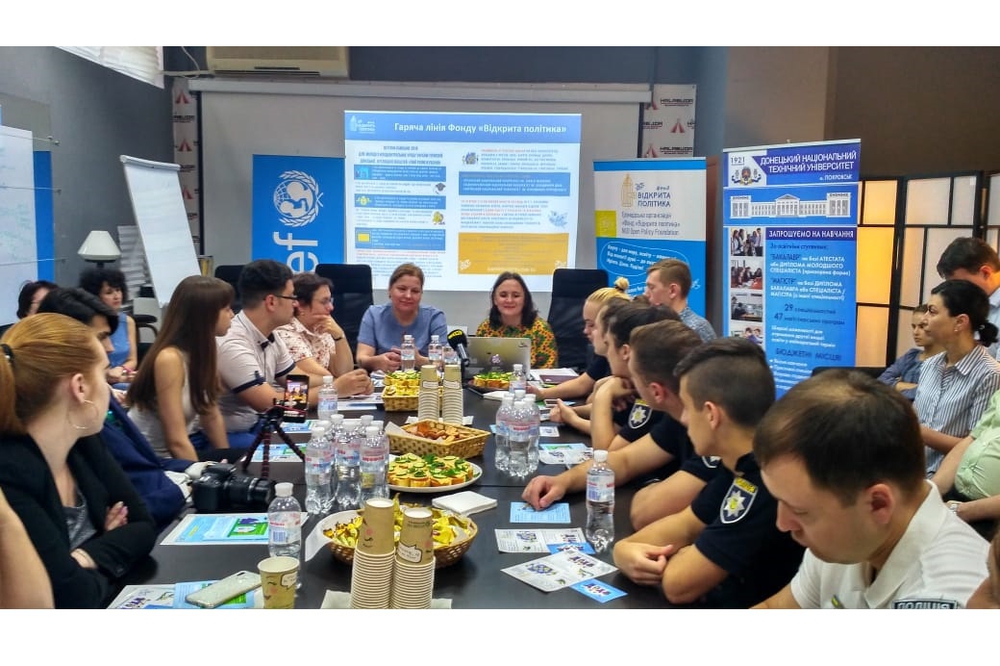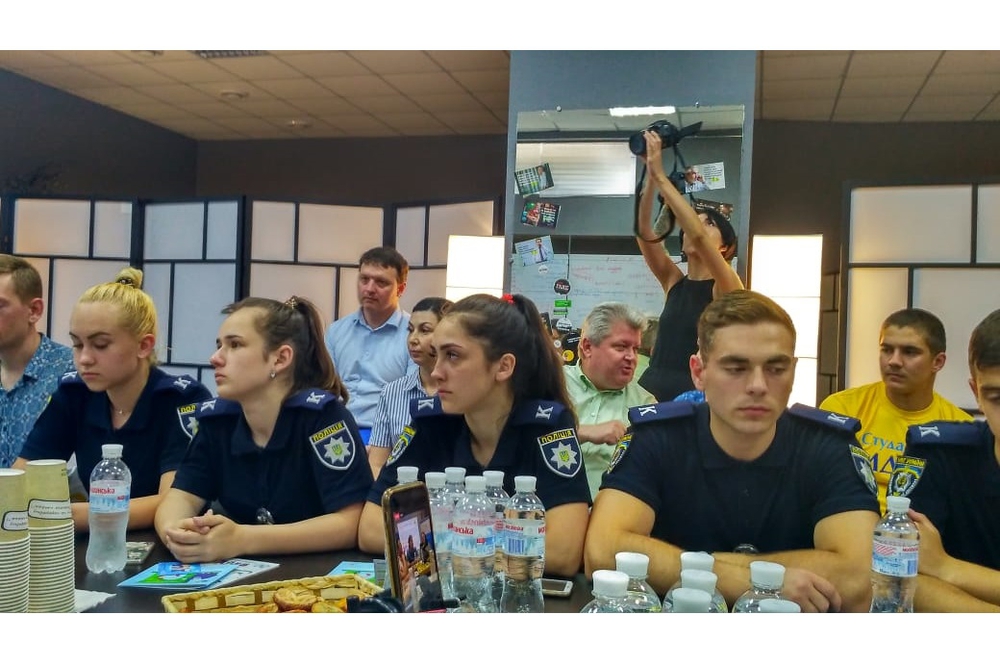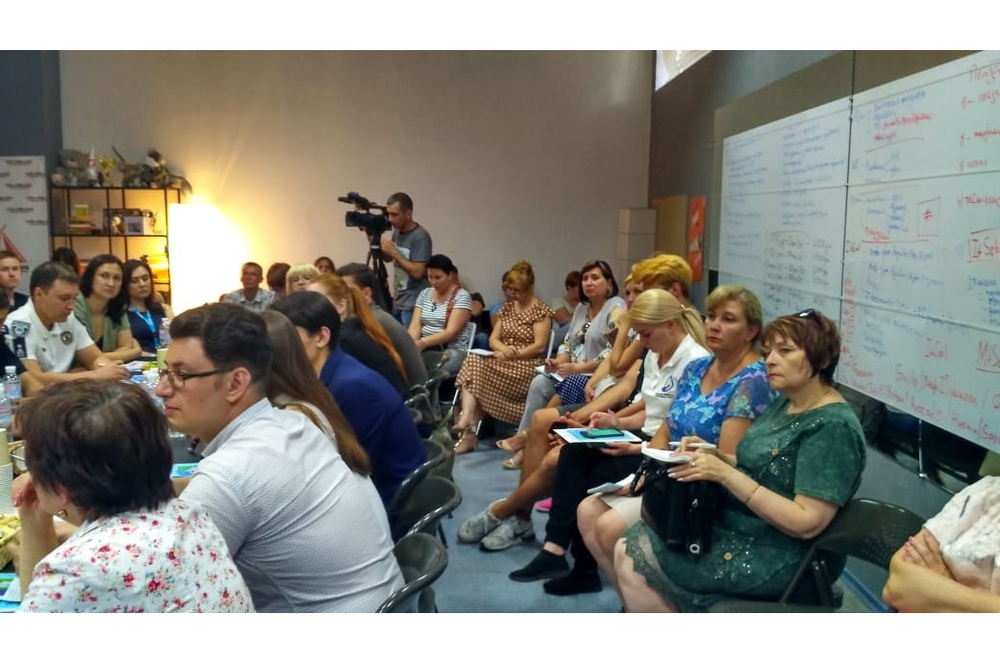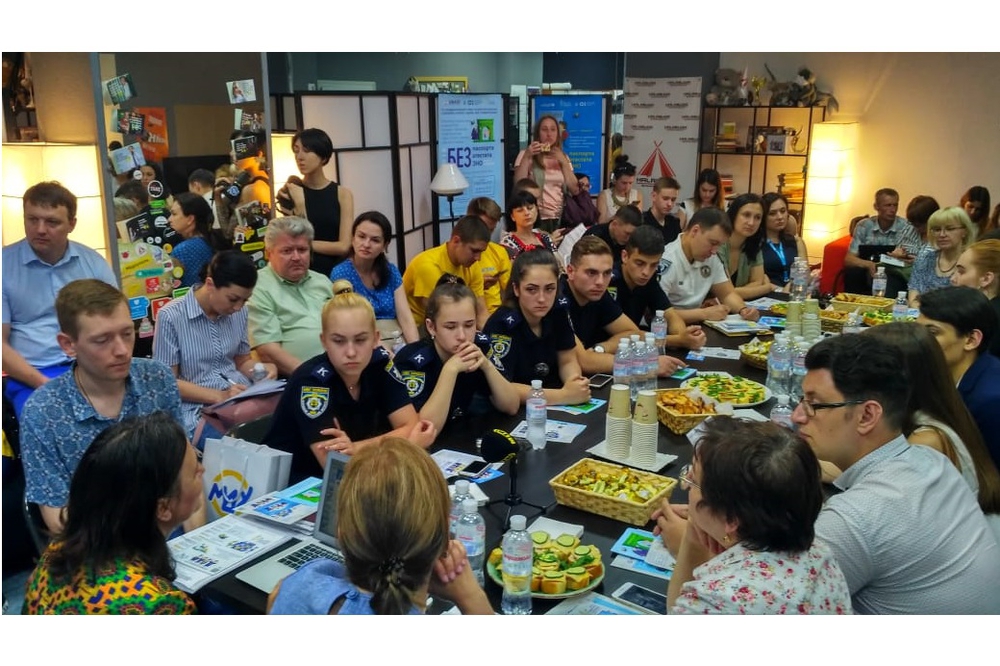News
During a press lunch in Mariupol, students from NGCA shared their success stories of entering HEIs through the Educational Centers
June 5, 2019, 9:16 p.m.During a press lunch in Mariupol, students from non-government controlled areas shared their success stories of entering HEIs through the Educational Centers
Students from Ukraine's non-government controlled areas of the Donetsk region, who are now successfully studying in higher education institutions in a controlled area, for the first time, shared their success stories describing their experience of entering HEIs through the “Donbas-Ukraine” Education Centers.
These stories were presented on June 4 in Mariupol, in the “Halabuda” educational hub, during a press lunch on the occasion to start the admission campaign for the residents of Crimea and the Donbas, and launch the work of the “Donbas-Ukraine” and “Crimea-Ukraine” Education Centers.
Organizers: Open Policy Foundation in partnership with the Ministry of Education and Science of Ukraine (MoES), the Donetsk Regional State Administration and with the support of UNICEF.
More than 40 people took part in the event, including representatives of the “Donbas-Ukraine” Education Centers, students of the Mariupol State University, the Donetsk Law Institute, Pryazovskyi State Technical University, the Mariupol Construction College, the Donetsk National Technical University, the Druzhkivska College of the Donbas State Machine-Building Academy, the Mariupol College of Arts, the Mariupol Mechanical and Metallurgical College, the Donetsk State University of Management, representatives of general education establishments that are involved in the Education Centers activities, Mass Media, representatives of the Main Directorate of the National Police in Donetsk Oblast, the Department of Education and Science of the Donetsk Regional State Administration and international organizations UNICEF and UNHCR.
During the event, representatives of the government, the public, educators, students and entrants informally communicate on educational opportunities in the region for residents of non-government controlled areas and territories along the “contact line”. The press lunch moderators were Svitlana KRETOVYCH, the head of the MoES’s Main Department of Higher Education, and Iryna ZHDANOVA, the executive director of the Open Policy Foundation.
“Our organization has reached the age of 11, and its goal is to cultivate values and develop the innovative potential of Ukraine. Since 2014, we have become directly involved in expanding opportunities for children and young people who have suffered from military conflict. And yet, for already 7 years, the International Green School have worked in the Carpathians, where for the last three years the representatives of the Education Centers and the educators from Eastern Ukraine come to learn how to conduct an information campaign, use modern technologies and learn Green STrEAM-methods, which will then be implemented in their own communities. Actually, it is the reason for our work to develop start-ups and innovations. It is extremely enjoyable that we have here the educational institutions of Donetsk Oblast, on the basis of which the “Donbas-Ukraine” Educational Centers have been successfully operating for four years. I see a lot of young people. They are just the entrants who became students thanks to the work of these Centers,” said Iryna ZHDANOVA, opening the press lunch.
Svitlana KRETOVYCH highlighted that the simplified procedure for admission through the Education Centers is extremely important for the Ministry of Education and Science of Ukraine since every citizen has the right to education.
“The Education Centers have been working for four years. The idea of creating simplified admission conditions is very important for us. All entrants who live in the non-government controlled area are citizens of Ukraine, and they have opportunities to obtain state-recognized certificates on education, find jobs, create families and make our state much better, without wars and other disadvantages. We have high expectations for these young people; we hope they will do what has never been done there in the Donbas. I hope that today we will hear your stories and wishes on how to make this procedure even more comfortable for children from the occupied territories. I am glad to see here representatives of higher educational institutions, technical schools and colleges from Donetsk Oblast. We have both Druzhkivka and Pokrovsk here, and many others. And let’s work fruitfully and improve this procedure so that everyone will come to our HEIs and receive a high-quality education,” added Svitlana KRETOVYCH.
SUCCESS STORIES OF STUDENTS
“After the ninth grade, my mother and I searched for different options, and we found detailed information on a college website how to enter using the simplified procedure. We followed all the instructions. I passed the exams and now I am a first-year student for the specialization of “design” of the Mariupol Construction College. I entered it thanks to the “Donbas-Ukraine” Education Center, exactly. They helped me with the preparation of documents, and I got a place in a dormitory for the examinations period.”
Veronika from Donetsk, the student of the Mariupol Construction College
“I am a student of the Donetsk National Technical University. I entered according to the IEE results. What is the most important for me is to be proactive. At the moment, while studying for the second year, I am the head of the university's commission on sporting and mass participation events. All doors are open here; it is important to be active.”
Oleksandr from Yenakiieve, the student of the Donetsk National Technical University (displaced to Pokrovsk)
“I entered in 2018 through the “Donbas-Ukraine” Education Center. I passed IEE with very low points, 133 was the lowest. I passed the entrance exams at the Education Center. I did not expect anything but the contract, but there was a budget place, and I got it. I study to be an ecologist. I am the head of the cultural mass movement at the faculty. Thanks to the Education Center, I have already achieved a lot in the first year. The main thing is not to be afraid and be open.”
Yuliia from Toretsk, the student of the Donetsk National Technical University (displaced to Pokrovsk)
“I come from Donetsk. I always dreamed to be a policeman. I passed IEE, but the points were not very high. When we applied to the admissions committee of the Donetsk Law Institute, there we were told about the “Donbas-Ukraine” Education Centers. We took advantage of this opportunity, passed the entrance and physical exams. It was difficult, but we did it.”
Andrii from Donetsk, the student of the Donetsk Law Institute
Separate attention was paid to the following admission features for this category of persons:
- Simplified admission procedure through the “Donbas-Ukraine” Education Centers;
- Schedule of the Education Centers, their list, deadlines for submitting documents for the state-funded education;
- Usual admission procedure and an additional IEE session;
- Hotline on education and the Dostupna Osvita website, dostupnaosvita.com.ua
SIMPLIFIED ADMISSION PROCEDURE through THE EDUCATION CENTERS
Entrants from non-government controlled areas of Donetsk and Luhansk Oblasts, territories along the “contact line” and Crimea may enter Ukrainian HEIs and vocation schools using a simplified system through the “Donbas-Ukraine” and “Crimea-Ukraine” Education Centers. The Centers will start working on June 3 and will last until September 27. You can find a list of Educational Centers in the relevant section on the Dostupna Osvita website, https://dostupnaosvita.com.ua/centers
“This year, ECs began to work on June 3, and they will stop their work on September 27; September 26 is the last day of documents acceptance. Entrants from non-government controlled areas have the opportunity to take examinations in the history of Ukraine, the Ukrainian language and subject-oriented entry tests. For those who will enter on the basis of the 9-th grade, it will be enough to take only the Ukrainian language exam and enter a college,” Svitlana KRETOVYCH said.
Entrants living in the above-mentioned areas (please, see the list of settlements following the link) have the opportunity to enter education institutions without passports, education certificates and IEEs, having passed the Ukrainian language and Ukrainian history examinations, and the subject-oriented/creative competition.
For this purpose, the entrant must apply to the Education Center, complete the educational declaration and pass these 3 entrance examinations.
At the same time, if the entrant has the IEE results or the Ukrainian certificate, he/she can also use the simplified procedure and enter HEIs through the Education Centers. It is also important that the surname of each entrant from the occupied territories is necessarily encrypted.
It is very important to pay attention to the dates of entering HEI on the state-funded basis. Although the Education Centers will work until the end of September, the deadline of filing documents for the budget form of study is July 2019.
DEADLINE FOR THE ENTRANCE ON THE BUDGETARY BASIS
Entrance on the budgetary basis for a bachelor (master) degree in medical, veterinary or pharmaceutical subjects
For entrants from Crimea and Sevastopol:
- Acceptance of documents - up to 12:00 on 19 July
- Entrance examinations - until 19 July
- Enrollment - until 03:00 p.m. on 22 July
For entrants from Donbas Oblast:
- Acceptance of documents - up to 06:00 p.m. on 22 July
- Entrance examinations - until 25 July
- Enrollment - until 12:00 on 1 August
Entrance on the budgetary basis for a junior specialist based on 11-th grade
For entrants from Crimea and Sevastopol:
- Acceptance of documents - up to 06:00 p.m. on 29 July
- Entrance examinations - until 28 July
- Enrollment - until 12:00 on 4 August
For entrants from Donbas Oblast:
- Acceptance of documents - up to 06:00 p.m. on 29 July
- Entrance examinations - until 28 July
- Enrollment - until 12:00 on 6 August
Entrance on the budgetary basis for a junior specialist based on 9-th grade
For entrants from Crimea and Sevastopol:
- Acceptance of documents - up to 06:00 p.m. on 13 July
- Entrance examinations - until 21 July
- Enrollment - until 06:00 p.m. on 29 July
For entrants from Donbas Oblast:
- Acceptance of documents - up to 06:00 p.m. on 13 July
- Entrance examinations - until 21 July
- Enrollment - until 06:00 p.m. on 29 July
However, even if entrants fail to submit the mentioned documents within the specified time, they have the opportunity to enter on a budgetary basis before 26 September, writing an application for transfer to the budget form of education after enrollment.
HOTLINE
The education hotline for children and youth, living in NGCA, along the “contact line”, has been working for 4 years at the Open Policy Foundation with the support of UNICEF and USAID (together with MoES during the admission campaign). Over the years, the Open Policy Foundation’s hotline has received more than 26,000 calls. About 4,000 of these calls were made from NGCA of Donetsk and Luhansk Oblasts, territories along the “contact line.” In May this year, the number of calls from the East was increased by one third compared to last year.
“In summer, the Foundation's hotline will work together with MoES from June 24 to August 9, 2019. Today, we have funding only until September 1. I dream that our hotline will be closed some day; so that you can study without “delimitation lines” live freely and peacefully. However, it seems to me that this dream, unfortunately, will not come true until September 1, 2019. Therefore, I ask the partners of the UN Educational Cluster to continue financing its work ,” Iryna ZHDANOVA emphasized.
In March 2019, the Foundation, in cooperation with MoES, the Education Departments of Donetsk and Luhansk Regional State Administrations, with the support of USAID, opened regional hotlines in Kramatorsk and Sieverodonetsk on the basis of regional education departments.
There are toll-free numbers: 0 800 504 522 (Kramatorsk) and 0 800 504 511 (Sieverodonetsk).
Mobile numbers are also available:
In Kramatorsk, +38 066 113 93 75, +38 097 904 71 91;
in Sieverodonetsk +38 099 345 20 76, +38 097 983 65 31.
What is especially important for communication with residents of non-government controlled areas is the telephone number +38 050 550 54 11 available via Viber/Telegram/WhatsApp.
This year, from June 24 to August 9, the Foundation’s hotline will work at MoES. Our consultants, in cooperation with MoES, will provide consultations on admission procedures through the Education Centers.
INFORMATION CAMPAIGN
In order to make important information available for entrants, the Open Policy Foundation, together with its partners, has been conducting an active information campaign for 4 years; its main message is “Education is available to everyone!” More than 2 million Ukrainians, including those from non-government controlled areas of Ukraine, were covered by the Foundation’s information campaign in 2018.
This year, with the assistance of the State Border Guard Service, we promptly placed at EECPs large banners and posters, distributed the step-by-step instructions/Eurobooklets and information products of ECs for schools, and for sharing in public transport. Ukrzaliznytsia placed leaflets in 69 trains, 966 railway cars of Donetsk, Odesa, South, Prydniprovsk, Lviv and South-West directions. Animated video clips are showing on 588 monitors of the Intercity trains.
An ASSISTANT to every entrant is the updated Dostupna Osvita website – dostupnaosvita.com.ua
The dostupnaosvita.com.ua site is an assistant to every entrant and schoolchild from the non-government controlled area and Crimea. The website has free, WITHOUT registration, video tutorials and video instructions to prepare for IEE and FSC in the Ukrainian language, the history of Ukraine and other subjects.
In 2019, the Open Policy Foundation, together with the Ukrainian start-up company Sannacode, updated the Dostupna Osvita website, launched in 2015, and created the Google Map of Education Centers and schools with distance education/external studies in Donetsk and Luhansk Oblasts. Now the site has a more functional design and additional useful content with interactive maps. It is also adapted for visually impaired people.
Social advertising for entrants from non-government controlled areas was also presented at the press lunch:
The animated video clip “Simplified admission procedure 2019 for entrants from NGCA, ‘contact line’”: https://www.youtube.com/watch?v=jKzmcJCuI_4
The road map for the entrant “Simplified admission procedure: 4 steps” (Eurobooklet)
You can view the complete video of the press lunch, following the link: https://www.youtube.com/watch?v=2gIkyHYEF0U&t=3259s
You can find more information at http://openpolicy.org.ua/ and https://dostupnaosvita.com.ua/, mon.gov.ua
Education – for Everyone!

